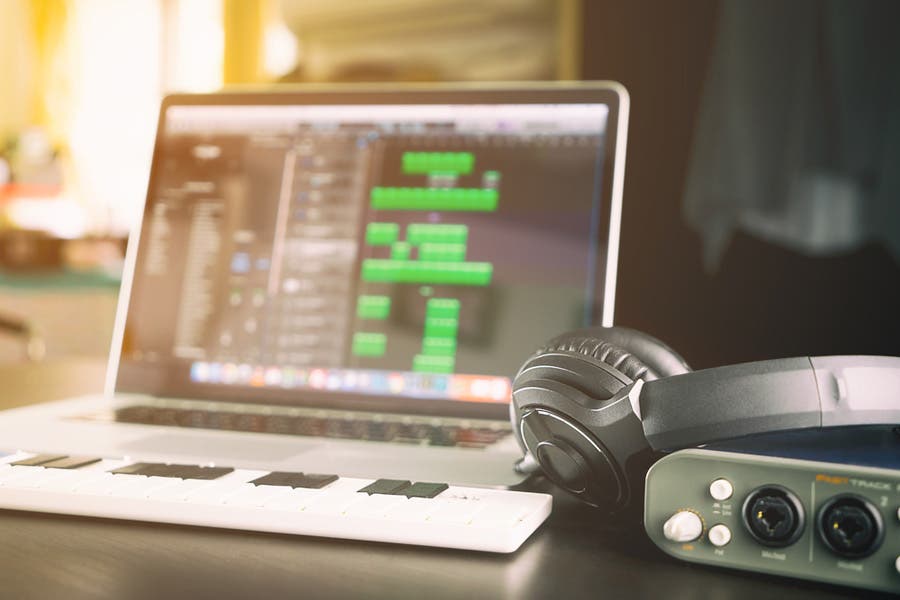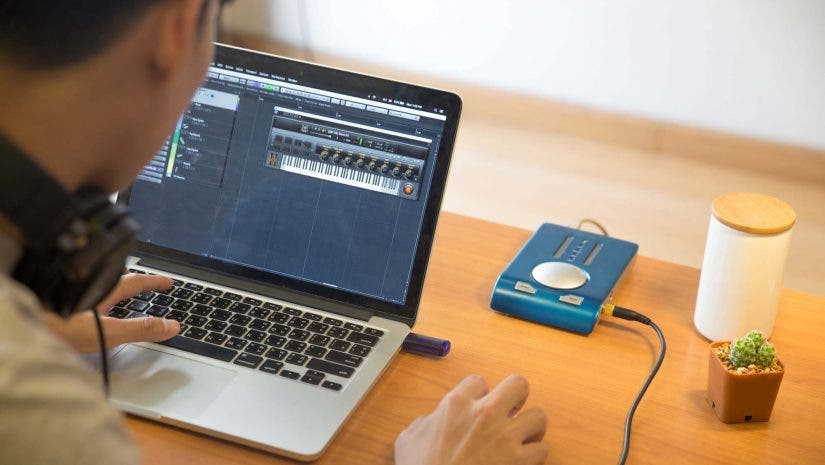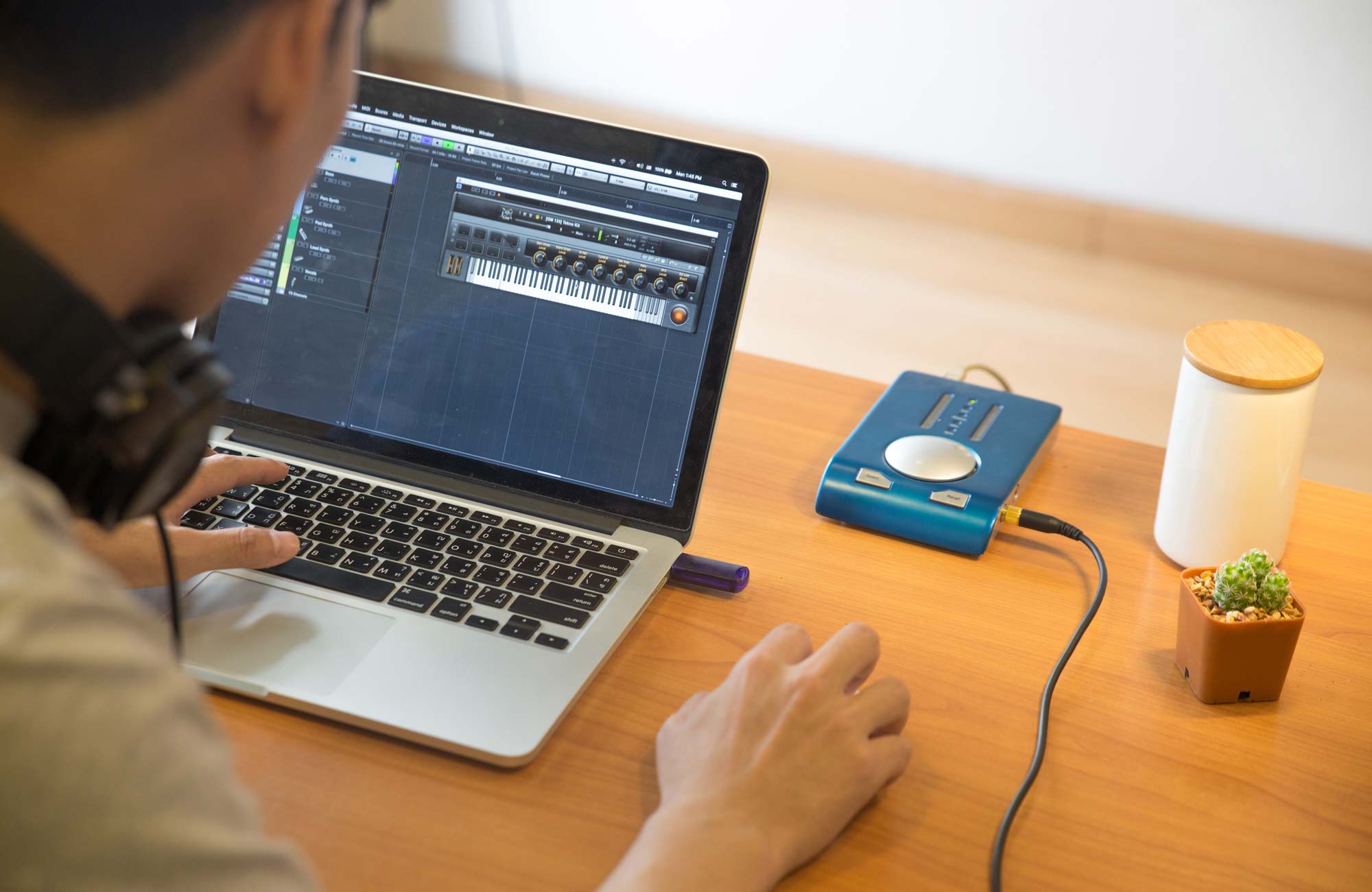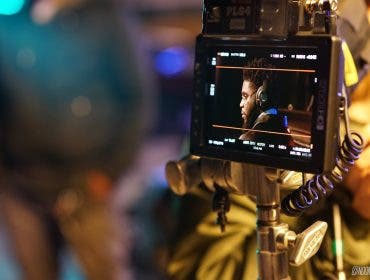Your computer is one of the most important pieces of hardware you’ll need if you want to get into music production. Desktop computers are great investments for your home recording studio, but laptops provide more portability if you ever need to hit the road while working on a project or if you constantly perform live.
It goes without saying that if you’re going to get a laptop, you’ll need to go all out and get a reliable one that comes with all the necessary specs that meet your workflow requirements. After all, its quality will affect your performance and efficiency as a music producer.
To help all you budding music producers or sound engineers with your buying decisions, we’ve compiled a list of the best laptops for music production—read on to see which ones made the cut.

Best Laptops for Music Production
Best Overall: Apple MacBook Pro 16″, Late 2021
This late 2021 Apple machine is the quintessential MacBook Pro for music production. At its core is the ultra-powerful M1 Pro chip, offering 10 CPU cores, 16 GPU cores, and 16 neural engine cores. In terms of performance, the 16” MacBook Pro provides more than enough juice for even the most demanding music production needs, though it sacrifices some of the portability of smaller laptops. A generous 1TB solid-state drive (SSD) stores and launches files with lightning-quick speed, and Apple reintroduced a number of physical ports missing from previous generations for creative flexibility.
Key Specifications:
- Processor: M1 Pro (10-core CPU, 16-core GPU)
- RAM: 16GB
- Storage Capacity: 1TB SSD
- Ports: 3x Thunderbolt 4, 1x SDXC card slot, 1x HDMI, 1x MagSafe 3
- Screen Size: 16” Liquid Retina XDR
Best Dual Screen: Asus ZenBook Pro 14 Duo
The ZenBook Pro series by Asus is cutting edge both in performance and design. The unique dual screen arrangement includes a 14.5” primary touchscreen display and a secondary 12.7” ScreenPad Plus touchscreen. For music production, users can split tasks between the two screens. For example, you can run both edit and mixer windows at the same time and glance between them. Users will also enjoy a range of ports suited to many music production accessories.
Key Specifications:
- Processor: 12th Gen Intel Core i7-12700H; 2.3 to 4.7GHz Performance 6-core
- RAM: 32GB
- Storage Capacity: 1TB SSD
- Ports: 1x USB-A, 2x Thunderbolt 4, 1x Micro HDMI, 1x SD/SDHC/SDXC slot
- Screen Size: 14.5” OLED touchscreen; secondary 12.7” touchscreen
Best Windows Option: Razer Blade 15 Advanced Model
Among the best PCs for music production is the Razer Blade 15. There’s a lot of crossover between gaming laptops and those that are also great for making music. Gaming at a high level requires power, and so does music production. The Razer Blade 15 comes with a capable 12th Gen Intel processor, 16GB of RAM, 1TB of storage, and a slim, lightweight case that’s perfect for making music on the go.
Key Specifications:
- Processor: 1.8GHz 14-core Intel i7-12800H
- RAM: 16GB
- Storage Capacity: 1TB SSD
- Ports: 1x Thunderbolt 4, 2x USB-C, 3x USB-A
- Screen Size: 15.6” 360Hz Full HD
Most Portable: Apple MacBook Air 13.6″, Mid 2022
Apple’s 2022 MacBook Air introduces a ton of performance-based improvements. This includes the brand new M2 chip as the brain of the operation, providing a formidable 8-core CPU. The laptop weighs just 2.7 pounds and is 0.44” thin, making it the most portable laptop for music production available. Physical ports are limited, but you can always expand them with USB-C dongles should you need more room for peripherals.
Key Specifications:
- Processor: M2 (8-core CPU, 10-core GPU, 16-core neural engine)
- RAM: 16GB
- Storage Capacity: 512GB SSD
- Ports: 2x Thunderbolt 4
- Screen Size: 13.6” Liquid Retina display
5 Important Laptop Specs for Music Production
There’s no point in spending money on the most expensive laptops if they don’t even have the specifications and features you need to be able to efficiently use them for your desired applications. Computer specifications may seem confusing, especially if you’ve never purchased a laptop for intensive applications, but you’ll only really have to check the following:
Processor
The computer’s processor is one of the most important specs to consider for any user who needs a workhorse that can run smoothly and fast even while using several heavy applications at once. When choosing a laptop for music production, check the number of cores its processor has. Four cores are pretty standard with laptops, but if you want something lighter and more compact, you may have to settle for a dual-core processor.
Another thing to consider is clock speed. For music production, it’s best to go with something within the 2.4 to 4.2GHz range. Again, you may have to go a little slower than that if you want a light and portable machine.
RAM
Nobody wants to deal with slow and glitchy programs—it can disrupt your workflow and may even affect the quality of your final product. To ensure that this doesn’t happen, make sure to get a laptop that has enough Random-Access Memory or RAM. Music production requires at least 8GB of RAM to enable you to work smoothly without any issues, but 16GB would be ideal.
Storage Capacity
Working with audio files will require you to have a lot of storage space. Before purchasing your laptop, decide whether you want one that has plenty of built-in storage space, or if you want to simply use an external hard drive to store all your files.
If you do want to store most of your files on the laptop itself, go for at least 1TB of storage.
You may also want to consider SSD vs. HDD when it comes to your laptop’s built-in storage. SSD reads and writes data much faster, but it’s definitely more expensive (per GB) than HDD. You can also go with a combination of both, similar to the storage setup on the Dell Alienware 15 R3.
Ports
Music production involves the use of several equipment, including microphones, instruments, control surfaces, audio interfaces, and more. With that in mind, one of the most important things to consider is whether a laptop has enough ports to create a seamless and efficient music production setup.
Of course, you can always purchase a USB hub—if you have one, the number of ports on your laptop may not matter as much. However, if you require a more portable setup, keep in mind that this is another added item to your gear list.
Screen Size
Finally, consider the screen size of the laptop you want to get. If you’re monitoring more than 10 tracks, then you’re obviously going to want a bigger screen. This specification is mostly a matter of preference or convenience, as anyone can easily work with whatever screen size they feel comfortable with.
Keep in mind that the more complex your productions are, the better, faster, and bigger these specifications have to be. There are many choices out there that may not have been mentioned here, but hopefully our list can help narrow down your choices.
Music Production Laptop Frequently Asked Questions
The most popular laptop for music production is the MacBook Pro. It combines powerful specifications along with almost universal software compatibility, making it the go-to choice for many music producers and creatives. Overall, though, there isn’t a specific laptop for music production that you have to use. The first major consideration is Windows or Mac. If you’re already familiar with one operating system or another, going with what you know will minimize the initial learning curve. After that, consider which digital audio workstation (DAW) appeals to your needs and crosscheck its minimum specs with the machine(s) you have in mind. This will help narrow things down.
Mac is the professional standard laptop for music production. The operating system is stable and it supports all of the industry’s leading software. Windows is viable as well, and the majority of software is also Windows compatible. Also, because Mac is the industry standard, you can exchange files with other Mac users and Mac-based studios without any hiccups.
As long as it meets the minimum specifications to run DAW software and has the appropriate hardware connections for an audio interface or other peripherals, you can use just about any laptop for music production. At the very least, you can perform basic music tasks with nearly anything— playing around with MIDI and virtual instruments, for example, or recording simple overdubs. The performance you’ll find in even inexpensive computers has democratized music production.






